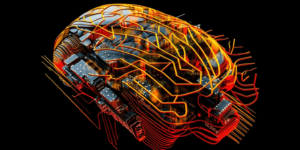Simple Definition of AGI:
AGI, or Artificial General Intelligence, refers to machines or computer systems that can think, learn, and understand like a human. It’s a type of AI that can perform any intellectual task that a person can do.
Complex Definition of AGI:
Artificial General Intelligence (AGI) is an advanced form of artificial intelligence that aims to mimic human cognitive abilities across various domains. This includes generalizing knowledge, understanding context, and exhibiting transfer learning capabilities.
AGI is characterized by its capacity for autonomy, adaptability, and versatility in problem-solving. It leverages complex machine learning techniques such as deep learning, reinforcement learning, and natural language processing to achieve human-like intelligence and exhibit a broad range of cognitive skills.
AGI: A New Age of Intelligence
It’s a brave new world, and we’re on the precipice of a game-changing technological revolution. Artificial General Intelligence, or AGI, is the golden chalice of AI research, and its implications for our future are profound. But what exactly is AGI, and why should you care?
Unlike specialized AI, AGI is the real deal. It’s the stuff of science fiction, where intelligent machines possess the same cognitive abilities as humans. Imagine a world where robots can learn, reason, and make decisions just like you and me. That’s the essence of AGI.
The Narrow Path: Specialized AI
To appreciate AGI’s significance, let’s contrast it with its sibling, narrow or specialized AI. While specialized AI is quite impressive, it’s strictly limited to a particular task. From voice assistants like Siri to algorithms that predict movie recommendations, these AI applications are designed to excel at one specific job.
In contrast, AGI is the multi-talented maestro, capable of mastering any intellectual task that a human can perform. It’s the difference between a one-hit wonder and a rock legend who can play every instrument.
Current State of AGI Research: Challenges and Breakthroughs
As it stands, AGI remains a tantalizing dream. But the AI community isn’t letting that deter them. Researchers are tirelessly working to overcome the challenges, and they’ve made significant strides in recent years.
One of the key hurdles is creating an AI that can understand context and generalize knowledge across different domains. Progress in areas like deep learning, reinforcement learning, and natural language processing has brought us closer to the finish line. Yet, the race to AGI is far from over.
Ethical Considerations and Societal Impact
The rise of AGI isn’t without its fair share of concerns. While the potential benefits are immense, so are the risks. AGI could transform industries, eliminate mundane jobs, and even help solve global challenges like climate change. But there’s a flip side to this coin.
Ethical dilemmas abound as we ponder the potential consequences of AGI. Will it be used to enhance human life or to undermine it? How can we ensure AGI will be aligned with human values and not manipulated for nefarious purposes? These are questions we must grapple with as a society.
Responsible Development and Deployment
Fortunately, we’re not blindly rushing into the AGI age. Many organizations, like OpenAI, are dedicated to ensuring AGI’s development is safe and aligned with the best interests of humanity. Their mission is to collaborate with other research institutions, creating a global community focused on addressing AGI’s challenges together.
In Conclusion: A New Chapter in Human History
The emergence of AGI is poised to mark a new chapter in human history. As the line between artificial and human intelligence blurs, we must remain vigilant, embracing the potential of AGI while addressing the ethical challenges it presents. It’s time to buckle up, dear reader, as the AGI revolution unfolds before our eyes. And remember, the future is in our hands.


